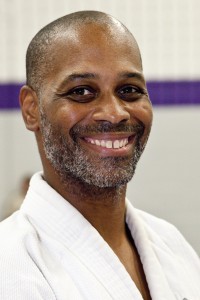
Monty Burton
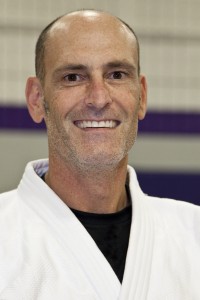
Wayne Lifshitz
—————————————————————————-
Duo Brings Uncommon Level of Athleticism, Knowledge of Martial Arts to Judo and Kata
Several weeks ago, in mid-August, judo life was simpler for Wayne Lifshitz and Monty Burton, two Shodans (1st degree black belts) from the NIH Judo Club who also attend the College Park Judo Club. Monty was on vacation with his family, and Wayne was at the YMCA International Judo Camp in New York. But everything was about to change.
Wayne checked his email early that day, and saw that one of the emails was from Barb Shimizu, USA Judo Kata Chairman. She was inviting Wayne and Monty to be on the US team to compete at the World Kata Championships, to be held in Malta in October.
“It was pretty shocking to get the message”, recalls Wayne. “Seeing who our (U.S.) competition was, I didn’t expect to get it so soon. We were dealing with Jeff (Giunta) and Heiko (Rommelmann), Karl (Tamai) and Diane (Jackson), Rob (Gouthro) and Lisa (Capriotti) – these guys have been at this way longer than we have.”
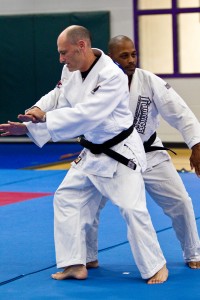
Monty got Shimizu’s email the same day. “I was shocked, basically. I was thinking, why did they choose us? – I had to reread the whole email to figure out what was going on. Did Wayne read it yet? He was at camp. Oh, man, what are we going to do? This is going to be in 30 or 45 days – am I going to be able to afford it? What should I do?
“That was the beginning of our conversations about whether to say yes or no. But I was amazed and I was happy. It was hard to talk on the phone because Wayne was at camp, and I was away on vacation with my family, so that weekend we couldn’t really contact each other so we were going back and forth with texts and emails, missing each other, we didn’t really get to talk with each other until 3 days later.”
Wayne continues: “I remember texting Monty, asking ‘Did you check your email today because this is no joke. We’ve got to start training tomorrow, assuming you’re saying yes’. I didn’t really give him a choice. ‘Yes’ was the answer.
“Actually I had asked Senseis Heiko and Diane, and asked if this was something we should do, or not do – are we ready? It was unanimous. Both of them said ‘absolutely, it’s not even a choice. You do what it takes to get there. It will be a life-changing, judo changing event.’
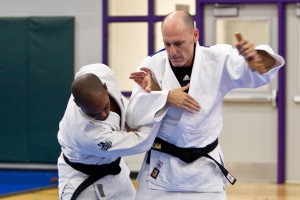
“When I had approached Heiko at camp that day to ask his opinion. he came right into my face. My heart was racing. I thought he was going to grab me by the neck and force me to say yes. Rather he hugged and congratulated me and then basically demanded we say that we accept. He said, ‘Whether you win or lose, it’s irrelevant. You are still better for going’.”
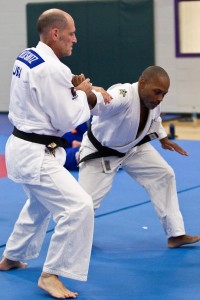
Serious Athletes, Extensive Martial Arts Background
Both Wayne, from Bethesda, MD, and Monty, hailing from Clarksburg, MD, bring an uncommon level of athleticism and martial arts to judo.
Monty played football in high school, was a college club gymnast at the University of Maryland, and followed that with karate, aikido, and MMA. Monty relates how he was introduced to judo: “In 2008 I had an old instructor in Krav Maga (Israeli Martial Arts) – I was doing that before this – he was coming to NIH Judo and said ‘You should check out NIH. It’s fun for the weekends, and if you like wrestling, you might like judo.’ At the time, you could grab legs, and do wrestling-like techniques. That’s how I got to NIH.”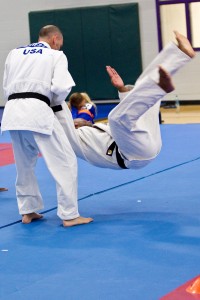
At the lower ranks, “I was loving judo, practicing judo. I didn’t have a goal or aspiration – it was just a good way to work out. I did a lot of other martial arts, and judo was the one that was taking less of a toll on my body, something I could do as hard or as light as I wanted to, and didn’t have to worry about getting kicked or punched in the face – so I stayed with judo. I was focusing on how nice it was to be with a lot of black belts and international players, so it was good to get all their feedback and their tutelage at the beginning, so that was how I was just enjoying judo.
“Personally, for me, in the dojos I had been in for karate and some MMA training, it was more about the individual, about self. The thing I liked about judo when I first got there was that it was more family-oriented, everybody wanted to have fun, nobody wanted to hurt anybody, and everybody wanted to get a little workout. It wasn’t about beating up the other person or showing who’s better, it was just about having a good workout and at the end of the night everyone was uninjured.”
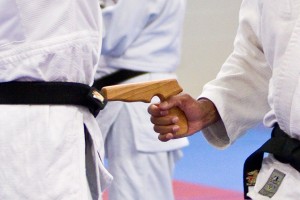
Wayne also brings an extensive athletic past to judo: “I was a state champion swimmer, competed in tennis, played water polo in college (UC Berkeley) where we won a few national championships, captained yachts, won sailing races. I just like sports and competing.
“I’ve been in judo since about 2008 or 2009, and came to it from Japanese jujitsu, which I had done for about 15 years before, including four or five different styles including weapons, pressure point, hand-to-hand combat. I came to judo because I thought that my throwing wasn’t very good because the other styles were so combative. I got a little bored, and wanted to try something new. I liked judo because of the history, which I really didn’t find in some of the other martial arts that I was doing. It has a lineage, people doing things the same way it was done before. There’s a structure and a method to the madness. And I like that even throughout their whole lives, people are still doing judo. I don’t see that in many other martial arts.”
Why did you start to concentrate on kata?
“I come from other martial arts where they do a lot of katas” says Monty. “It’s a good way to practice, a good way to perfect techniques, to get the theory behind why things are the way they are. I got into kata because for 2nd degree brown you have to start testing, to do Nage No Kata in order to get the rank. When we started doing kata, I started understanding the judo techniques even more, especially with Nage No Kata. For me kata allowed me to bring over other martial arts into judo, take those techniques and bring them in and put them together.”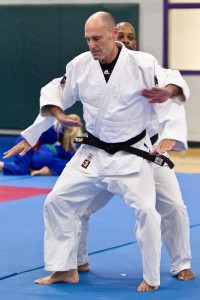
Did you go to Goshin Jutsu specifically to bring those other martial arts in?
“When I first started Goshin Jutsu, I said, “We can do this kata”. It has elements of mixed martial arts and other katas, so that a lot of the techniques I did before, so a lot of the knife techniques, the gun techniques, were all similar to those other martial arts, so I figured we would do well in that kata. Even though we started with Nage, I thought that Goshin was the one we should do.”
Wayne adds, “I came into judo from doing jiujutsu. I had done Japanese jiujutsu for about 15 years before, doing armlocks, wrist locks, finger locks, very ‘break bone’ kind of stuff, but you really couldn’t see a technique through without really hurting someone. And practices were getting to the point of more talking than actual practicing. I wasn’t sweating, and it wasn’t a workout. I knew about College Park Judo, but I was just too lazy to come here because of the traffic. I knew about NIH judo but I was too unmotivated to go there because of the security that is required to get on campus. I just got fed up with jiujutsu. The club where we were training moved, so I went to NIH where I basically tested right into green belt.”
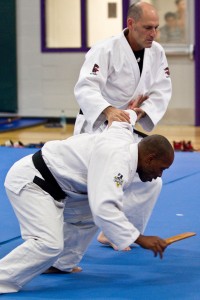
What was your goal when you first came to judo?
Wayne: “To learn to throw better. We had all the same throws in jiujutsu, but I just never got to it because by the time I needed it, I already had broken fingers and wrists and elbows, but I would never throw you. Although I had to do it for promotion, they weren’t good. So I came to judo to perfect my throwing. And then I saw that you could randori, and get a good sweat on, and actually proverbially ‘fight’ with someone and nobody is getting hurt. And grab a beer when you’re done. Which I wasn’t having in jiujutsu, which was too street-oriented.”
The two of you have always been kata partners and have placed multiple times in the US Nationals.
Monty: “Yeah, we’ve come in second in Nage, and third in Goshin this year. We barely missed in Ju No Kata – but we’ll be back next year.”
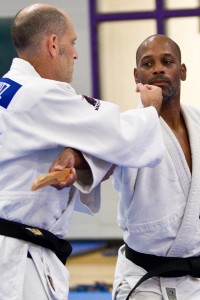
Coached by Senseis Robert White and Brad Lewis at NIH, and by Senseis Karl Tamai and Diane Jackson at College Park, Wayne and Monty have been getting outstanding guidance in their preparation for Malta.
“I would add Heiko Rommelmann and Jeff Giunta and their Bushido Kai Judo Club”, adds Wayne. “I worked with them on Goshin this summer and they’ve been super helpful. We’ve sent them our Nationals videos, and they’ve sent us written feedback. We video ourselves here and they’ll send us feedback. They’ve invited us up to New York to train with them. They’re the current national champions and they’re usually the ones in this spot. Even though we are now their #1 competitor for this spot, they’re still super helpful in helping us beat everyone who’s not American.”
This is your first international competition. What are you thinking?
Monty: “Pretty excited, pretty crazy because of the short notice. We had just been talking about this, that it would be nice to go to the Worlds in a couple of years if we keep it going, do well in Nationals, and now we find ourselves here already. It’s awesome.”
Wayne: “But I think it’s kind of a testament to how much time we put into it that we have become kata geeks, if you will. We have watched and read everything.”
Has this idea of going to the World Championships in kata changed your approach to kata?
Monty: “It’s more about the small details, the little things. Where are we supposed to be at the finish, where our feet are supposed to be, where my hand is supposed to be, as opposed to the big stuff, such as I need to get my stick here or my knife there. Now it’s really watching a lot of videos – like studying tape in football – you’ve just got to figure out what’s going on. We’ve been looking at opponents, too, people that might be out there, so we can find out if we concentrate on this part of the techniques, on our strengths, will it outscore them on their weaknesses. It really is taking on another level of interest and focus.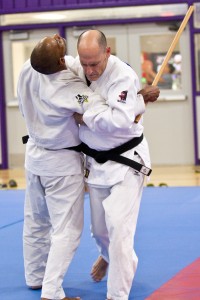
“I welcomed it because there’s a way to do it when you’re in the United States – the American way, and then there’s the way to do it on the international scene. When we first started doing Goshin, we were approaching it from the international way. So when we did the Nationals, it was slightly off and different, and it’s going to be nice to take this kata that we feel and have trained for in the international way to an international competition and see how we score there as opposed to having the controversy of the American way at the Nationals. So I’m really looking forward to seeing how that goes there.”
Wayne: “I think I look at the theory. Why is he attacking me? Why is the technique done in such a way? What is my reaction to his attack, and why am I doing that? And to understand it. We both come from jiujutsu, street fighters, and so we’re bringing that street element to it. Are you going to do that? Then this is what I’m coming back with.
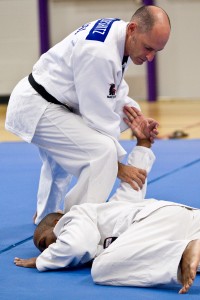
“As Monty said, we have read all the rules. I know exactly what they’re looking to mark us off for, so it’s not gross motor anymore, it’s micromotor. Especially since the scoring now is starting at ten and then they go down, rather than from zero up, know exactly what they’re marking you down for. That’s what a competitor does when you watch tape. I want to know what you’re looking for, so I give the judges what they want to see.
How has your approach to judo in general changed?
Wayne: “It has made me more of a student. If you look where we came from, we started competing locally here in College Park. Then we’ve gone out to Indiana, to North Carolina, so we started competing then regionally and it took it up a little bit more. Then we went to Nationals. And now when I look at the listings of all the countries that are registered, I think holy cow – this is not some guys from Texas and Florida that are all American, this is the big show. And I think it’s made me more of a student of judo. Like Monty said, even for Nage No Kata, all those throws and falls are much better for me because I’ve studied it through kata rather than someone just teaching how to do seoinage but look, this is the perfect way.
“When people look at kata, I feel they may diminish it because it’s not hand-to-hand combat like you would get in shiai (sparring competition). But the throws, as you can see, are much more powerful and deliberate, and they’re pure because tori and uke execute it in a specific way. And I think when we do it, at least in my head, I’m imagining myself in front of an audience, and the audience wants to see what this looks like.
“When an audience comes to a shiai, bang – it’s over. They don’t even know what happened. But this kind of breaks it down for the audience. Maybe gets more people into judo, but it has made me more of a student. I don’t just listen to what goes on at practice – I look at everything else that’s going on. I love going to other clubs and seeing what I can learn there from other people as well.”
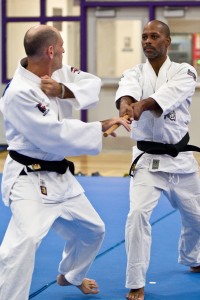
Monty adds: “It’s kind of like two different things – judo fighting and judo kata. I’ll go and do randori (sparring practice) and practice my favorite moves and do my favorite thing in different ways, but I’m always practicing pretty much the same thing all the time – the one or two techniques I really like to do. And that’s great. But to understand judo, and to get your black belt you want to study a little bit more and you want to be more knowledgeable and want to understand the techniques, I think you have to make a jump to kata to do that. I think that’s what gives you the opportunity to really say, I know my foot is supposed to be here, I know my hip’s supposed to be there – in randori you don’t get that. In randori, I’m going to throw you the best way I can. Kata is like, I’m going to throw you the right way, the way you’re supposed to do in judo.”
Wayne: “To piggyback on that, I think that kata teaches you more breadth. And I think that if you are going to be teaching other people, it’s helpful to know the complete range of judo, including kata.”
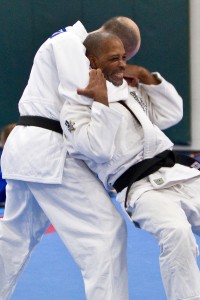
“I have to add in one thing. To get to this level, there’s a lot of time and effort and studying, not just coming to practice, but sitting at home watching videos and reading stuff. So we have to give a plug to our wives and their support. They may not always get it, but they are supportive of what it means. And we have three kids, Max is 13, Simon is ten, and Phoebe is six.”
Monty: “Every Tuesday, or Saturday, and sometimes Thursday, I have to be out here. We have two little kids, Kai, 4, and Cami, 2, and when I’m gone she’s watching them. And I appreciate that, especially for this. If I’m not going to the Worlds or Nationals, I can skip a class and it doesn’t really matter. But now that we’re on this level, I have to go, and she understands the gravity of it, so she’s cool with it.”
Wayne: “I’d also like to add that at the judo camp, Sensei Heiko made the announcement that we had been chosen to represent the US in Goshin Jutsu at the Worlds. It was incredibly humbling to me for him to have done that publicly, and a great example of Jita Kyoei, mutual welfare and benefit.”
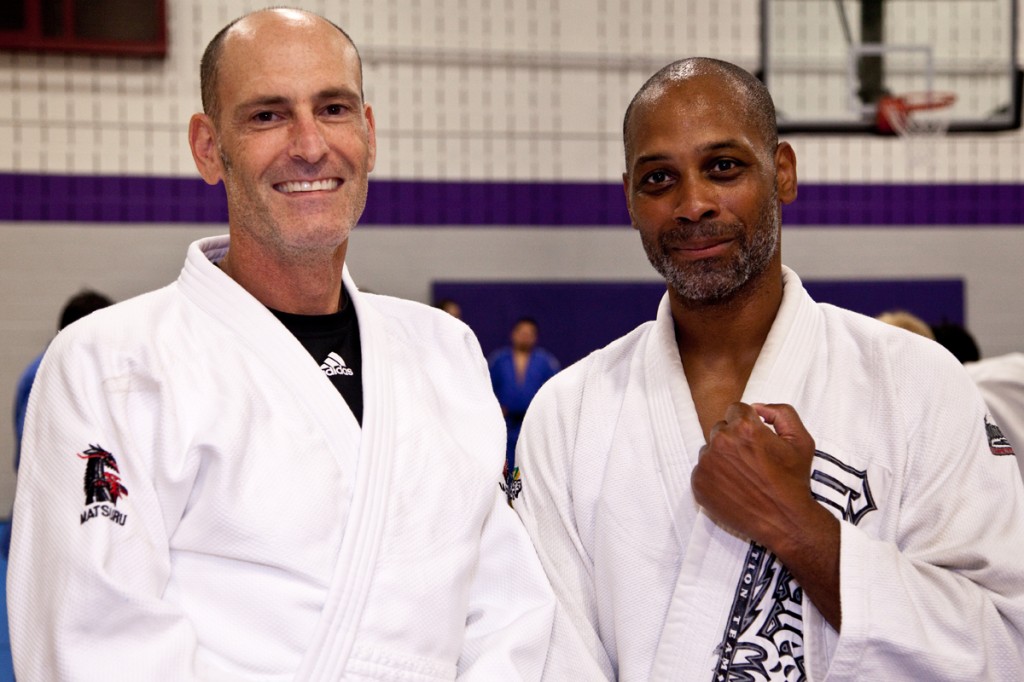
Wayne Lifshitz and Monty Burton, Members of the 2016 US International Kata Team
Shufu also congratulates the teams of Diane Jackson (Hui-O Judo) and Karl Tamai (College Park Judo), and Rob Gouthro and Lisa Capriotti (Hui-O) for being named to the US International Kata Team for the World Kata Championships in Malta.
Chuck Medani

















